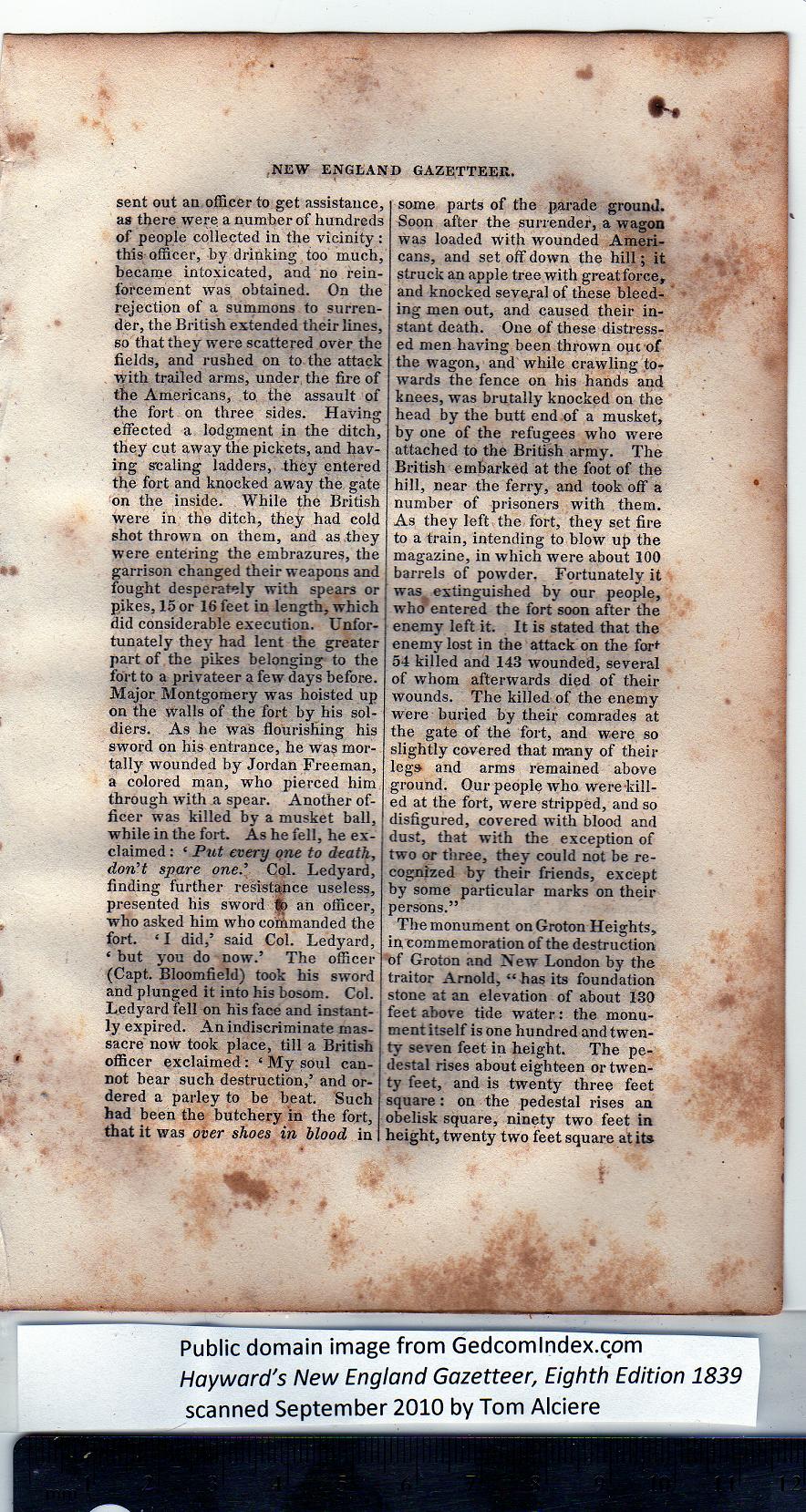|
sent out an officer to get assistance,
as there were a number of hundreds
of people collected in the vicinity:
this officer, hy drinking too much,
became intoxicated, and no rein-
forcement was obtained. On the
rejection of a summons to surren-
der, the British extended their lines,
so that they were scattered over the
fields, and rushed on to the attack
with trailed arms, under the fire of
the Americans, to the assault of
the fort on three sides. Having
effected a lodgment in the ditch,
they cut away the pickets, and hav-
ing scaling ladders, they entered
the fort and knocked away the gate
on the inside. While the British
were in the ditch, they had cold
shot thrown on them, and as they
were entering the embrazures, the
garrison changed their weapons and
fought desperately with spears or
pikes, 15 or 16 feet in length, which
did considerable execution. Unfor-
tunately they had lent the greater
part of the pikes belonging to the
fort to a privateer a few days before.
Major Montgomery wTas hoisted up
on the walls of the fort hy his sol-
diers. As he was flourishing his
sword on his entrance, he was mor-
tally wounded by Jordan Freeman,
a colored man, who pierced him
through -with a spear. Another of-
ficer was killed by a musket ball,
while in the fort. As he fell, he ex-
claimed : 4 Put every one to death,
don’t spare one.’ Col. Ledyard,
finding further resistance useless,
presented his sword Ip an officer,
who asked him who commanded the
fort. ‘I did,’ said Col. Ledyard, |
4 but you do now.’ The officer
(Capt. Bloomfield) took his sword
and plunged it into his bosom. Col.
Ledyard fell on his face and instant-
ly expired. An indiscriminate mas-
sacre now took place, till a British
officer exclaimed: 4 My soul can-
not bear such destruction,’ and or-
dered a parley to be beat. Such
had been the butchery in the fort,
that it was over shoes in blood in
some parts of the parade ground.
Soon after the surrender, a wagon
was loaded with wounded Ameri-
cans, and set off down the hill; it
struck an apple tree with greatforce,
and knocked several of these bleed-
ing men out, and caused their in-
stant death. One of these distress-
ed men having been thrown ouc of
the wagon, and while crawling to-
wards the fence on his hands and
knees, was brutally knocked on the
head by the butt end of a musket,
by one of the refugees who were
attached to the British army. The
British embarked at the foot of the
hill, near the ferry, and took off a
number of prisoners with them.
As they left the fort, they set fire
to a train, intending to blow up the
magazine, in which were about 100
barrels of powTder. Fortunately it
was extinguished by our people,
who* entered the fort soon after the
enemy left it. It is stated that the
enemy lost in the attack on the fort
54 killed and 143 wounded, several
of whom afterwards died of their
wounds. The killed of the enemy
were buried by their comrades at
the gate of the fort, and were so
slightly covered that many of their
legs and arms remained above
ground. Our people who were kill-
ed at the fort, were stripped, and so
disfigured, covered with blood and
dust, that with the exception of
two or three, they could not be re-
cognized by their friends, except
by some particular marks on their
persons.”
The monument on Groton Heights,
in commemoration of the destruction
of Groton and New London by the
traitor Arnold,44 has its foundation
stone at an elevation of about 130
feet above tide water: the monu-
ment itself is one hundred and twen-
ty seven feet in height. The pe-
destal rises about eighteen or twen-
ty feet, and is twenty three feet
square: on the pedestal rises an
obelisk square, ninety two feet in
height, twenty two feet square at its |
